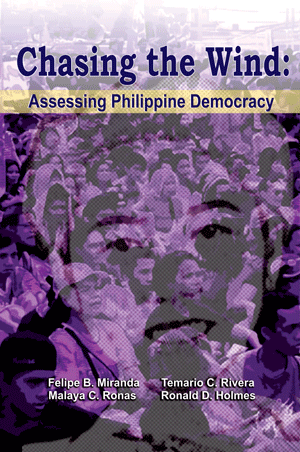Rethinking democratization in the Philippines
 CenPEG is posting two chapters from the new book, Chasing the Wind: Assessing Philippine Democracy (2011), published by the United Nations Development Program (UNDP) and launched in March this year. The book is authored by Felipe B. Miranda, Malaya C. Ronas, Ronald D. Homes, and Rivera.
CenPEG is posting two chapters from the new book, Chasing the Wind: Assessing Philippine Democracy (2011), published by the United Nations Development Program (UNDP) and launched in March this year. The book is authored by Felipe B. Miranda, Malaya C. Ronas, Ronald D. Homes, and Rivera.
“We have not had any successful transition to a democratic regime. We have failed to
meet even the minimum conditions of a procedural democracy: free and fair elections. How
can we even refer to our system as a “democracy” when much of its electoral contests continue
to be perverted by outright violence and coercion. Moreover, powerful political clans have
consistently dominated various national and local positions in the country, foreclosing the
prospects of wider electoral competition and political participation.” Temario C. Rivera,
International Christian University (Tokyo)
Chapter 2 In search of credible elections and parties: The Philippine paradox
Chapter 5 Conclusion: Rethinking democratization in the Philippines
Chasing the Wind: Assessing Philippine Democracy
“Jointly authored by a group of prominent Filipino political scientists (three former presidents of the Philippine Political Science Association and one long-time editor of the Philippine Political Science Journal), this book challenges the conventional wisdom that the Philippines is a democracy. Going beyond the traditional approaches to understanding democracy, the authors offer a reconceptualization of democracy anchored on three essential elements: an expanded notion of public accountability, a sensitivity to regime outcomes particularly on key indicators of human development, and a definite period for assessing the effectiveness of these practices and outcomes. To substantiate their claims, the authors provide a rigorous rethinking of the concept of democracy backed up by systematic studies on the country's electoral practices and party system, the accountability mechanisms among the major agencies of government, and the impact of civil society and the decentralization process.
While critical of the failed democratization process in the country, the authors do affirm the urgency of collectively struggling for a truly democratic order.” (From the back cover)
- Probing presidential platforms
- Conference calls for people-centered policy actions for Asian development and peace
- WWII 'comfort women' urge visiting Japanese emperor: OFFICIAL GOV’T APOLOGY, UPHOLD TRUTH, and JUST COMPENSATION
- FEARLESS FORECAST (EPISODE II): Comelec will not comply with e-Commerce Law in 2016 elections
- Fearless forecast: Comelec’s non-compliance with the AES law in 2016 (last of 2 parts)
- Fearless forecast: Comelec will not comply with the AES law in 2016
- CenPEG releases travelogue
- Experts: Nuisance bets reflect disillusionment, uneven playing field
- Partylist solon presses for tax cuts
- The True Cost of a Political Campaign
- Management decisions: Based on RA 9369 or purely Comelec’s?
- CenPEG holds 1st roundtable with media on presidential poll results
- Filipino IT can do it!
- FIT4E: The only transparent solution
- Realpolitik in the maritime tiff
- China’s challenge to PH sovereignty
- Choosing the next president
- Fixing the presidency, reforming the state
- New Comelec chair says he’s open to other election technologies
- SC ruling on AES Watch Pabillo and IBP vs Comelec, Smartmatic-TIM
- Comelec must explain P3.2B unliquidated cash advances
- CONGRESS ASKED TO HOLD DEMO ON PCOS HACKING
- 25 Bishops ask poll body to stop midnight deal with Smartmatic
- Pope Francis: reform and conversion
- 2 poll watch coalitions stage rally vs Comelec-Smartmatic midnight deal
- AES Watch questions Comelec-Smartmatic midnight deal
- ASEAN-India: Building Youth Partnerships through Culture and Entrepreneurship
- CenPEG forges research exchange and partnership with Jinan University
- FOI: Bearing fruit or foiled again?
- Remittance with Representation: The right to vote of overseas Filipinos
Center for People Empowewrment in Governance (CenPEG), Philippines. All rights reserved


